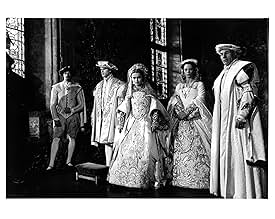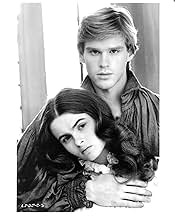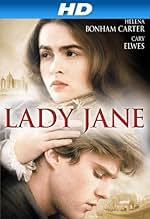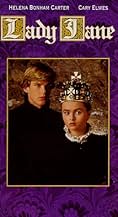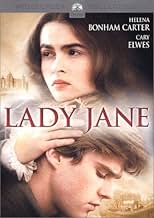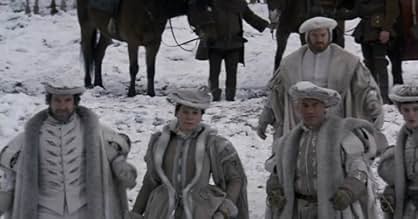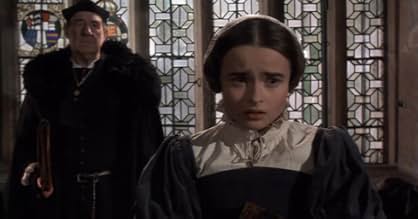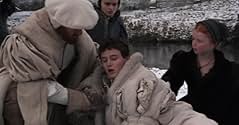La muerte del Rey Enrique XVIII crea caos en el reino por las disputas sobre su sucesión. Ansioso por mantenerse fiel a la Reforma, el ministro John Dudley casa al moribundo hijo del rey con... Leer todoLa muerte del Rey Enrique XVIII crea caos en el reino por las disputas sobre su sucesión. Ansioso por mantenerse fiel a la Reforma, el ministro John Dudley casa al moribundo hijo del rey con Lady Jane Grey.La muerte del Rey Enrique XVIII crea caos en el reino por las disputas sobre su sucesión. Ansioso por mantenerse fiel a la Reforma, el ministro John Dudley casa al moribundo hijo del rey con Lady Jane Grey.
- Dirección
- Guionistas
- Todo el elenco y el equipo
- Producción, taquilla y más en IMDbPro
Opiniones destacadas
I first met this young couple, Lady Jane and Guildford, in 1990 and watched it over and over until I had my favourite quotes down pat, like all those mentioned on this site.
The music and drama draw you into the movie, from the opening scenes with the pounding horse hooves to the passion and love found in the closing scenes.
Seeing the movie 15 years later renewed old emotions, dreams and memories of the past. I've encouraged friends to watch it with me, including my new husband! He won't admit it, but even for a period movie, he enjoyed it. He also enjoyed teasing me when I was blowing my nose through the final scenes. I cry every time! It's such a touching and inspirational movie, of the excitement of first love, family torment, and just wanting to experience life and make a difference.
I highly recommend this movie, it has something in it for everyone.
Helena Bonham Carter plays the title role - Lady Jane Grey - cousin of the young King Edward and a fanatical Protestant who is manouvered into taking the throne after Edward's death at the age of 15. Jane - also 15 - is at first overwhelmed by the thought of being Queen, but then embraces the throne. Her immaturity, however, and wilfullness (not surprisingly for a 15 year old) get the better of her and lead to her downfall after only nine days on the throne, and Mary's accession. Carter was excellent in this role. Cary Elwes also offered up a strong performance as Guilford Dudley, whom Jane is forced to marry against her will, but whom she falls passionately in love with. The supporting cast included performances - all of them quite good - by Sara Kestelman as Jane's mother Frances, Patrick Stewart as her father Henry, John Wood as the Duke of Northumberland (Guilford's father), Warren Saire as the young King Edward, and - playing this role absolutely perfectly - Michael Hordern as Dr. Feckenham, confessor to Princess Mary. In fact, there really wasn't a sub-par performance in this movie.
It isn't perfect, mind you. It's a little bit too long, and I found myself, particularly in the last hour or so, wondering when it would end. Some of the history is questionable. Many historians think that neither Jane nor Edward were as innocent in the plot to keep Mary from the throne as the movie portrays them, and the love story between Jane and Guilford is, as I understand it, largely fictional. But the basics are quite correct, the behind the scenes plotting believably portrayed and the religious struggle of the time absolutely authentic. It's well worth watching this movie if you are interested in this period of English history.
7/10.
The cinematography was stunning, both indoor and outdoor shots were beautifully visualised and captured. The sets and costumes also were extremely well done.
Legally, in fact, the position was complicated. Mary, like her sister Elizabeth, had been declared a bastard by their father Henry VIII. Towards the end of his life, however, Henry had passed the Third Succession Act, which restored his daughters to the line of succession without formally legitimising them. Edward, as he lay dying, had executed a will excluding Mary and Elizabeth from the succession and naming his cousin Jane as his successor, although, because this will had not yet been ratified by Parliament at the time of his death, Mary's supporters argued that it carried less weight than Henry's Act. Jane was proclaimed Queen by the Privy Council, who then promptly abandoned her when they realised that Mary enjoyed more popular support and that attempts to prevent her accession were doomed to failure.
"Lady Jane" was the third British film about Jane's life after a silent version from the 1920s and "Tudor Rose" from 1936, neither of which I have seen. It was made in 1986, during the "Thatcher Years", to a script by the well-known left-wing playwright David Edgar, so it is perhaps unsurprising that it is essentially Tudor history rewritten to suit the Guardian-reading classes of the 1980s. It is a curious mixture of costume drama and political tract, of fact and fiction. It follows the essential outlines of Lady Jane's story but contains two major divergences from historical fact.
The first of these concerns the relationship between Jane and her husband Lord Guilford Dudley. At first Edgar paints them as they are portrayed in most history books- Jane as intellectually precocious, scholarly and devoutly religious, Guilford as a debauched young man more interested in frequenting taverns and whorehouses than in reading Plato. Both are initially reluctant to marry and have to be coerced by their parents, who see the match as politically and financially advantageous. In the film, however, Jane and Guilford quickly fall deeply in love, although the historical evidence suggests that they disliked one another intensely throughout their marriage.
Edgar's second major divergence from history is his attempt to introduce twentieth-century politics into the period. During their brief reign Jane and Guilford are so shocked by the poverty of their subjects that they introduce a reformist political agenda- distribution of land among the peasantry, state-funded relief of poverty, universal free education based upon progressive principles and the abolition of corporal punishment. At times I thought I was watching an alternate history fantasy about how England, under the enlightened rule of Queen Jane the Good, became the world's first socialist welfare state nearly four centuries before such ideas caught on in the rest of the world. In the film it is this reformist agenda, as much as any popular support for Mary, which causes Jane's Council to abandon her cause, her Councillors all being wealthy Establishment figures with much to lose from such socio-economic reforms. Also, Mary's determination to marry Philip of Spain was due more to political considerations than to romantic love, and Thomas Wyatt's rebellion did not aim to restore Jane to the throne. (By 1554 England's Protestants had turned to Elizabeth as their champion).
And yet, despite Edgar's tendentious distortion of history, this was a film which I enjoyed in many ways. The love story of Jane and Guilford, however ahistorical it might be, was touchingly handled. Helena Bonham Carter, in her second major film role, was not as good as she had been in "A Room with a View" the previous year, making Jane perhaps rather too priggish. Cary Elwes, however, is good, playing as Guilford as that familiar figure from coming-of-age dramas, the truculent, rebellious teenager who matures into a sensitive, caring young man when he finds true love. Jane Lapotaire is also good as Queen Mary, making her more sympathetic than one would expect given her popular reputation as the tyrannical "Bloody Mary". It is a far more subtle portrayal of the Queen than Kathy Burke's demented fishwife in "Elizabeth". Other good performances come from Patrick Stewart and Sara Kestelman as Jane's overbearing parents, John Wood as her devious, scheming father-in-law the Duke of Northumberland, Warren Saire as the tormented King Edward and Michael Hordern as Doctor Feckenham, the elderly Catholic theologian who vainly tries to convert Jane to his faith. (Despite Edgar's modernising agenda, he does not try to hide the religious controversies of the period, with Jane's fervent Protestantism and Mary's equally fervent Catholicism much to the fore).
The film was directed by Trevor Nunn, best-known as a stage and television director. It is one of only three feature films he has made, the others being adaptations of Ibsen's "Hedda Gabler" and Shakespeare's "Twelfth Night". Yet on the basis of this film and "Twelfth Night" (I have never seen "Hedda") it seems a pity that he has not worked more in the cinema. Here he handles his material well, the story moves fluently and there are a number of memorable scenes. I was particularly struck by the one where Jane and Guilford announce their wishes for the country, with each wish smashing a wine-glass with the exclamation "Then it is done!" Even though it might tell us more about the 1980s than the 1550s, "Lady Jane" is still a very watchable historical romance-drama. 7/10
While none of the performances are bad, or even mediocre, some bits manage to shine even brighter. Jane Lapotaire as Princess Mary is wonderfully haunted by longing and desperation behind the strong, poised front. Patrick Stewart shows us ever so briefly that his Henry Grey is not only a cold-hearted conspirator and dominating patriarch, but a father who desperate needs to make things right for his little girl. Helena Bonham Carter and Cary Elwes play superbly off each other as Lady Jane Grey and Guilford Dudley, bringing out nuances in each other's performance that cement the core of this beautiful story.
¿Sabías que…?
- TriviaWhile imprisoned, the real Guilford Dudley carved the name "Jane" inside his cell at the Tower of London. It can still be seen today.
- ErroresAlthough the movie clearly has rewritten history to make a romance, in reality Jane and Guilford never lived in their own home, nor did they ever live as man and wife in the short time they were together; within a month of the marriage Jane was crowned Queen (and refused to crown Guilford King), and 9 days later they were both in prison, lodged in separate towers, and never had contact again.
- Citas
Dr. Feckinham: And what would you be prepared to die for, Lady Jane?
Jane: I would die to free our people from the chains of bigotry and superstition.
Dr. Feckinham: What superstition did you have in mind?
Jane: Well, for example, the idea that a piece of bread can become the body of our Savior, father.
Dr. Feckinham: Did he not say at his Last Supper, "Take, eat, this is my body"?
Jane: He also said, "I am the vine, I am the door." Was he a vine, was he a door?
Dr. Feckinham: Who has been teaching you to say such things?
Jane: Don't you think I could have thought of them myself?
- ConexionesReferenced in As You Wish: The Story of 'The Princess Bride' (2001)
Selecciones populares
- How long is Lady Jane?Con tecnología de Alexa
Detalles
- Fecha de lanzamiento
- País de origen
- Idiomas
- También se conoce como
- Lady Jane - Königin für neun Tage
- Locaciones de filmación
- Productoras
- Ver más créditos de la compañía en IMDbPro
Taquilla
- Presupuesto
- USD 8,500,000 (estimado)
- Total en EE. UU. y Canadá
- USD 277,646
- Fin de semana de estreno en EE. UU. y Canadá
- USD 55,964
- 9 feb 1986
- Total a nivel mundial
- USD 277,646
- Tiempo de ejecución
- 2h 16min(136 min)
- Mezcla de sonido
- Relación de aspecto
- 1.85 : 1


